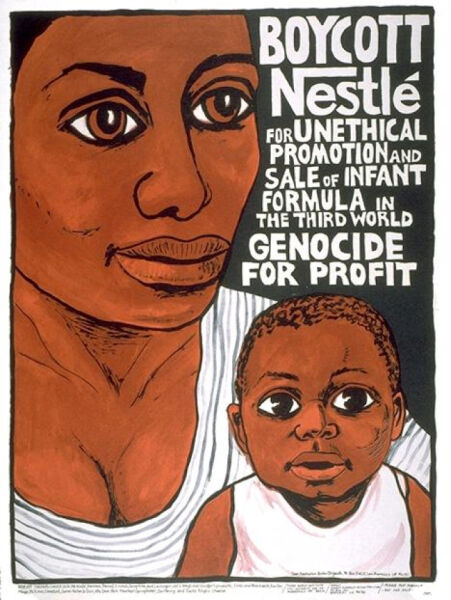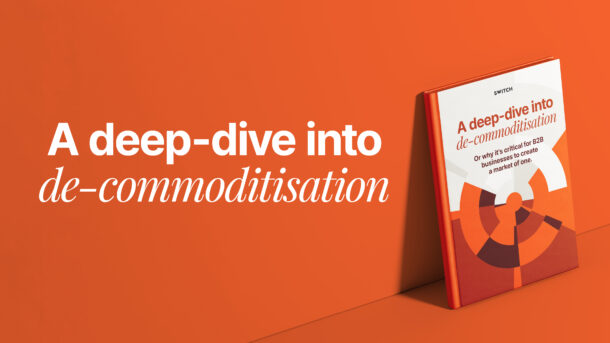B2B marketing is traditionally considered an area that is highly strategic.
This means we look at financials and business processes before we look at the brand itself.
Current vernacular abbreviates ‘Business to Business’ into the rather loathsome B2B acronym and now that it’s here to stay, let’s give it the upgrade it deserves.
Let’s go with Brand to Brand marketing and see how this can change our mindset for the better.
Thinking specifically about Business to Business is an approach that removes some of our marketing obligations. In a way, it’s an admission that we’re about to get quite lazy with our marketing efforts, wrapping sales tactics in pretty colours and trying to pass that off as marketing.
It’s not the way B2B marketing ought to work.
After all, B2B involves at least one brand that’s having a conversation with another brand so the rules of brand apply.
Stand for something
Of course, you’re in this for financial gain. Otherwise, you’re not a business.
But let’s put that aside for the moment because you could be doing almost anything else for financial gain so your brand must have a purpose that’s stronger than a bottom line.
A purpose-driven brand, a brand that knows why it jumps out of bed in the morning and what drives its every decision throughout the day, is a powerful one and it commands respect. It means that your audiences are more likely to listen to what you have to say.
Think of the first three brands that come to your mind when you read ‘powerful brand’. Seriously – take a breath and do this.
We’re prepared to bet that each of them is clearly purpose-driven.
Now imagine an unsolicited email in your inbox from one of these brands.
How quickly would you hit that email and read right through it? And how much more likely are you to follow through than if it had originated from a lukewarm brand?
To those who think “Oh, but a brand is just a logo.” or “Isn’t brand something that marketing does when they’re doing something customer-facing?”, we have some news for you.
And the most succinct way of delivering the bulletin is in the word ‘No.’
Your brand gives you purpose.
This is what starts to create a powerful set of perceptions in the minds of your audiences. Your audiences include those businesses (and their brands) that you’d like a conversation with if you hope to make a sale.
When one of those three powerful brands came to your mind, you weren’t thinking about their financials (even if they likely have pretty powerful numbers). Brands occupy a space in our mind for less rational reasons. They stick with us because of emotional associations and we form these associations when a brand has attributes that are more human than operational or financial.
So, if you want to be successful at Brand to Brand communication, start by remembering what it is your brand stands for and commit that as the reason for you to do almost everything throughout your work day.
Anything else is a distraction.
This kind of thinking opens doors to meaningful conversations. A sales call turns into a powerful reason for doing business because, as humans, we can’t resist the pull of someone who is genuinely purpose-driven.
Be true to yourself
Your brand has a set of principles that it abides by.
It’s easy to think of our brand’s values as those words on the wall of the office or printed in your glossy vision statement – the words we put there for our sales people to use when they’re speaking to potential customers.
B2B is not an excuse to violate principles.
Every time a brand breaks away from what it stands for at B2B level, there are negative repercussions down the line.
Think of brands that promise responsible behaviour – they source their raw materials responsibly and package their finished products in eco-friendly ways.
Then they’re in the news for treating their employees badly in some manufacturing facility halfway around the world.
What’s gone wrong?

The brand’s principles have been relegated to a set of customer-facing mantras and the people responsible for the business itself have taken decisions independently of their principles.
A Brand’s values start in the boardroom and are cascaded down the line to make sure no one responsible for the actions of that brand can take a decision that violates its principles. This way, a business can never be caught out. It can never be accused of saying one thing and doing another because it is true to itself behind the scenes, it is principled at a B2B level so the cascade of exemplary behaviour is a virtuous inevitability.
Be true to your principles at a B2B level and you will attract suppliers and corporate customers that are similar in mindset. B2B marketing exists with the intent of fostering and maintaining long-term and value-based relationships – and a similar mindset is a very powerful foundation for these life-long partnerships.
We realised this the hard way. We bent our principles and accepted a couple of clients that were clearly very different from us. For a while it was good – we reached our billings targets and were up to our elbows in work that wasn’t glamorous but paid the bills. In time, the relationships started to break down as we violated our values to keep these clients happy at the expense of the team spirit at Switch. We actually lost a couple of team members to this clusterfuck. By the time we realised what we were doing, we’d caused serious damage to our team and to our brand and had to put plenty of effort and resources into replacing the clients who were so far from our way of being with others that share our values.
Learn from our mistakes because it is cheaper and easier than it is to learn from your own. Your principles help you attract like-minded business. Just as importantly, they keep those entities that aren’t aligned with you firmly outside your door.
Be human
We don’t form personal connections with a ‘business’ because we are not a species that’s wired to connect with a massively complex operation.
We form connections with those brands that have a very human aspect to them.
Of course, as a relationship develops from the initial spark into a massively complex interaction between two operations, the usual rules of business engagement apply – but let’s not forget that even the most long-standing and successful B2B relationships out there started with a single conversation between a small group of humans.
While a typical B2C drive may take a lazy hit-and-miss approach backed by the confidence of speaking to a massive audience, a B2B marketing effort can have an audience that you can count on one hand.
Every contact matters. A successful B2B conversation can turn the fortunes of any company, regardless of its scale -o, while it might be tempting to jump in and sell, it pays to be human first. The best brands, the ones we admire and form connections with, are deeply human and your brand will be best served speaking to other brands with the assumption that a human is speaking to another human.
Collabs between brands are age-old and on the rise with good reason. Fashion brands have collaborated with artists for decades, brewers are known to get together to share recipes and ingredients, car manufacturers that pull in brands to give them credibility in areas they’re not known for, and the unstoppable force that’s swept socials where fashion/beauty/nutrition/etc brands collaborate with influencers are only going to be more pervasive.
How do you think these conversations start? Are they business to business chats or brand to brand? Are they trying to achieve manufacturing efficiency, lower raw material costs, or shorter lead times? Or are they attempting to give a more human side to a brand that could benefit from a new set of brand associations that are primarily human?
When Nike and Michael Jordan first had their B2B conversations, I doubt they predicted a multi-billion dollar brand would be born. Thinking business to business could give a fun hookup but brand to brand thinking leads to longer lasting relationships.
What does this mean for my brand?
You’re probably asking yourself where to start.
After all, B2B thinking is famously brand agnostic.
Think again.
If you’re approaching a B2B conversation, you can walk into a meeting with a solid set of financials or you could walk in with the intent to grow the brand equity of both sides of the table.
Ideally, you set out to achieve both.
- Analyse the strengths of your brand. Surprise the stewards of your brand with a request for a chat and ask them to give you the lowdown on the positive associations of your brand, the brand’s purpose, its values, and everything else that’s absolutely irresistible about it.
- Research the brand you’re talking to as a brand and not only as a balance sheet. Understand its purpose and its values. Seek out common traits and areas where the two brands can combine to create positive associations.
- There doesn’t need to be a perfect values match. But the two brands need to have plenty of common ground where fundamental beliefs are concerned.
- Be prepared to show that financials and brand equity are inseparable. This works both ways. If there appears to be commercial benefit at the expense of a true meeting of brand values, you’re probably not going to reap the benefits that a strong brand association would give you. Know when to walk away from a quick win and towards a more sustainable relationship.
In essence, let’s be true to the ancient wisdom of B2B marketing, that of seeking common ground when approaching a B2B conversation.
Only this time we will think brand first – dig deep into your purpose and your values and those of your prospect and seek a meaningful set of principles or values that you both hold dear. This gives a more fundamental understanding of common ground than the financials can and relationships built on solid ground deliver more value over a longer period of time.




